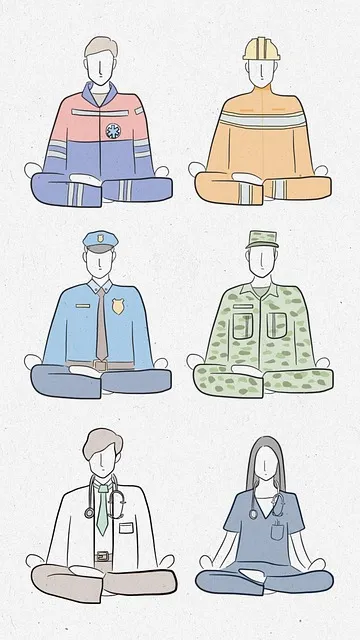Mental wellness apps, like those utilizing the Kaiser Permanente psychiatry phone number in Wheat Ridge, are gaining popularity as accessible and personalized tools for stress management and mental health support. These apps offer intuitive features such as mood tracking, mindfulness exercises, and community forums, fostering a holistic approach to mental wellness. As demand grows, developers must prioritize user-centric design, ethical considerations like data security under HIPAA regulations, cultural sensitivity, and fairness in algorithmic bias to ensure effective and responsible mental health app development.
In today’s digital age, mental wellness app development has emerged as a vital tool for improving access to care. With organizations like Kaiser Permanente recognizing the need for innovative solutions, particularly in areas like Wheat Ridge, these apps offer personalized support. This article explores key aspects of mental health app creation, focusing on user-centric design, ethical considerations, and privacy safeguards. By understanding these elements, developers can contribute to a robust and responsible ecosystem of mental wellness resources accessible to all.
- Understanding Mental Health App Development: A Need in Modern Times
- Designing User-Centric Features for Enhanced Engagement
- Ethical Considerations and Ensuring Privacy in Mental Wellness Apps
Understanding Mental Health App Development: A Need in Modern Times

In today’s fast-paced world, mental wellness app development has emerged as a vital tool to cater to the growing need for accessible and personalized mental health support. With increasing awareness about the importance of mental well-being, many individuals seek convenient ways to manage stress, enhance resilience, and maintain a healthy mind. This shift is particularly notable among younger generations who, according to research, are more open to embracing digital solutions for their mental health concerns.
The demand for effective Stress Reduction Methods and Resilience Building tools has led to a surge in the search for innovative solutions, especially within communities like those served by Kaiser Permanente psychiatry phone numbers in Wheat Ridge. Mental wellness apps offer a discrete and often affordable approach to coaching programs that can help individuals navigate through anxiety, depression, or simply learn techniques to maintain equilibrium in their busy lives. With features such as mindfulness exercises, mood tracking, and personalized recommendations, these apps are revolutionizing how we access mental health resources, ensuring better care for those seeking support from the comfort of their homes.
Designing User-Centric Features for Enhanced Engagement

In developing a mental wellness app, designing user-centric features is paramount to enhancing engagement and fostering meaningful interactions. Apps like those aimed at supporting individuals with their mental health journey should be intuitive, personalized, and responsive to users’ unique needs. Incorporating features such as customizable dashboards, real-time tracking of mood and symptoms, and access to therapeutic resources can significantly improve user experience. By prioritizing user feedback and employing design thinking methodologies, developers can create apps that truly resonate with their target audience.
For instance, consider the Kaiser Permanente psychiatry phone number in Wheat Ridge as a point of contact for users seeking professional help. Integration of such services within the app can boost confidence by providing immediate access to support. Additionally, incorporating tools for stress management, mindfulness exercises, and community forums can enhance social interaction and risk management planning for mental health professionals, thereby contributing to a holistic approach to public awareness campaigns development in mental wellness.
Ethical Considerations and Ensuring Privacy in Mental Wellness Apps

Mental wellness apps have gained significant popularity, offering convenient access to support for users’ mental health and well-being. However, as this technology continues to evolve, so do the ethical considerations surrounding its development and use. One of the primary concerns is ensuring user privacy and data security, especially when dealing with sensitive information related to mental health conditions. App developers must adhere to strict privacy regulations, such as HIPAA (Health Insurance Portability and Accountability Act) in the United States, which sets guidelines for protecting patient data. For instance, the Kaiser Permanente psychiatry phone number in Wheat Ridge can serve as a resource for individuals seeking professional help, emphasizing the importance of secure communication channels within these apps.
Furthermore, cultural sensitivity in mental healthcare practice is another crucial aspect to consider. Apps should be designed with an understanding of diverse cultural backgrounds and beliefs to ensure they are inclusive and effective for all users. Addressing anxiety relief and resilience building through evidence-based practices can help create a supportive digital environment. Developers must also be mindful of potential biases in data and algorithms, striving for fairness and equality in delivering mental health services via these innovative platforms.
Mental wellness apps have emerged as a vital tool in modern times, offering accessible support for individuals seeking mental health resources. By focusing on user-centric design and ethical practices, developers can create engaging and safe environments. As seen with organizations like Kaiser Permanente, integrating phone numbers for expert help, such as their psychiatry services in Wheat Ridge, can further enhance app functionality. With thoughtful consideration of both user experience and privacy, mental wellness apps have the potential to revolutionize access to care and improve overall mental health outcomes.






